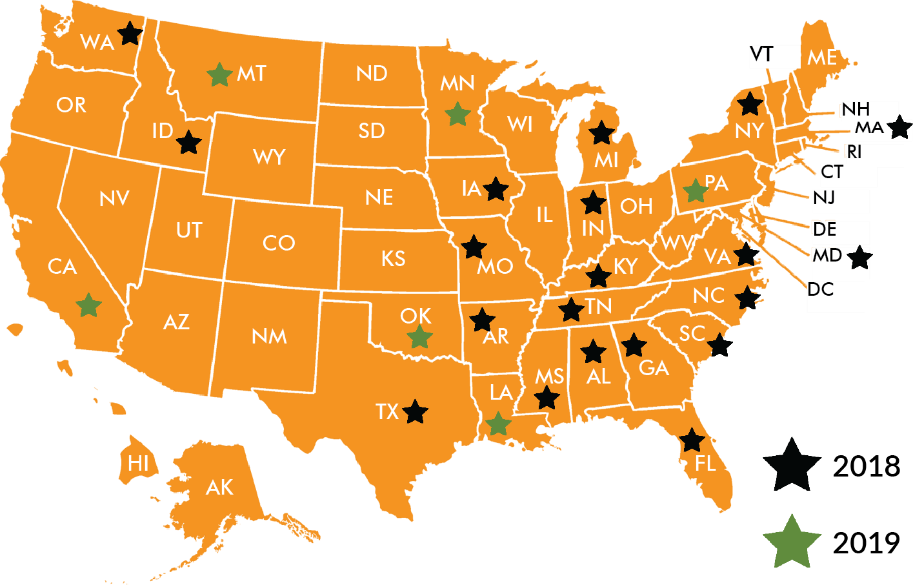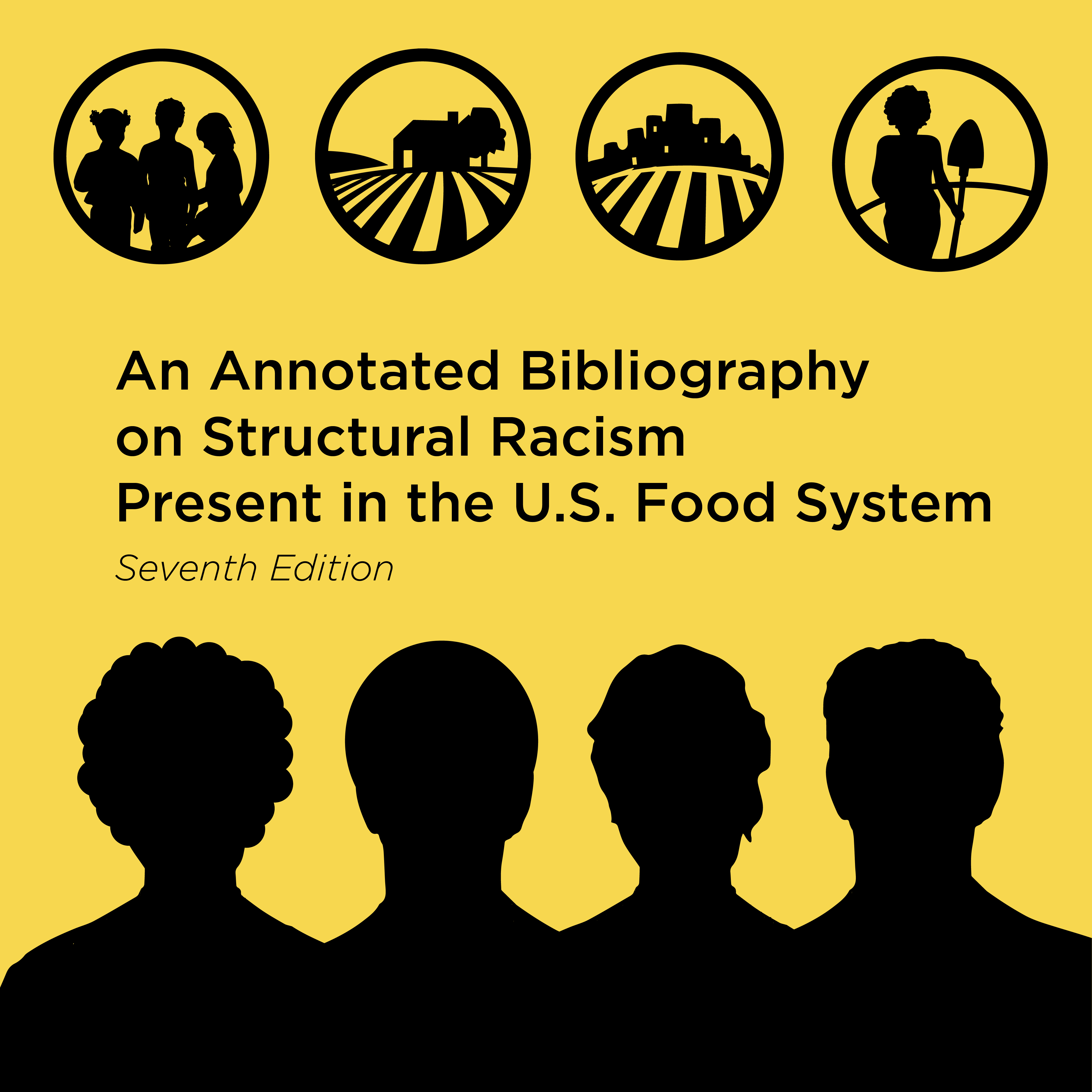Building diversity, equity, and inclusion capacity for extension educators across the United States
MSU Center for Regional Food Systems and MSU Extension are collaborating in Michigan and nationwide to better serve BIPOC students, community members and colleagues.

In January 2020, MSU Center for Regional Food Systems surveyed more than 710 professionals who had registered for at least one racial equity in the food system webinar since 2018. One question asked, “In the next five years, what level of progress do you expect your organization to make in reaching racial equity related goals?”
Respondents from land grant universities were half as likely as their peers in non-profit organizations to expect significant racial equity related progress (21% vs. 43%). These findings emphasize the importance of increasing capacity for land grant professionals so they can work more effectively with their community based non-profit colleagues in addressing racial inequities within the food system and beyond.
Land grant universities and cooperative extension services (CES) have been essential to the historic and continued strength of the United States. They create and connect people with knowledge that is foundational to economic development, strong communities and thriving individuals.
At the same time, MSU Center for Regional Food Systems (CRFS) and MSU Extension (MSUE) recognize that these organizations have been a part of the ongoing systemic oppression of Black, Indigenous and People of Color (BIPOC). In response, CRFS and MSUE have begun their own work to better serve BIPOC students, community members and colleagues.
One example is by actively learning and engaging CES and food systems stakeholders across the country to build diversity, equity and inclusion (DEI) capacity and improve race relations. Dionardo Pizaña, an MSUE specialist who focuses on DEI, said the first place to start is by looking inward.
“Unless we’re doing the work internally [as individuals and as an organization], there’s no way we can do it with integrity [within our communities].”
Engaging extension educators in civil dialogue
Following the 2014 protests in Ferguson, Missouri and the national elections in 2016, the Extension Committee on Operations and Policy (ECOP) realized the role that extension could play in community work on complex issues like racism and racial awareness. The team determined that training around civil dialogue was needed to support cooperative extension professionals in their work to dismantle racism. Coming Together for Racial Understanding (CTRU) was the national effort that emerged.
Twenty-six states were represented at week-long CTRU workshops in 2018 and 2019. The curricula was drawn from Everyday Democracy and the Southern Rural Development Center (SRDC). SRDC’s Rachel Welborn led the efforts.

Each state was encouraged to send up to three representatives -- one from the state’s 1862 land grant, as well as one from an 1890s (historically Black university) and 1994 (tribal college) land grant institution, if applicable. After CTRU, participants return home to train colleagues, as well as state and local community members.
Pizaña facilitated two days of each five-day training in 2018 and 2019.
“[CTRU] continues the legacy of extension working in communities around complex issues. It’s really adding to that history,” he said.
CRFS Director Rich Pirog helped raise part of the funds for the national workshop, including partial financial support for Pizaña to facilitate. Following the national convenings, the team from Michigan, which included Pirog, wanted to bring what they learned back and help other extension educators build DEI capacity.
Pizaña’s office in collaboration with other MSUE staff who participated in the 2018 CTRU session offered two Michigan trainings in 2019. In total, 50 MSUE and CRFS staff participated as well as 20 local Michigan community leaders.
“At that time, we were the only state doing that type of a partnership -- a train-the-trainer model with community members and our staff,” said Pizaña.
Kimberly Carr, formerly a postdoctoral research fellow at the MSU Center for Regional Food Systems in the College of Agriculture and Natural Resources and Center for Interdisciplinarity in the College of Arts & Letters, participated in the March 2019 CTRU workshop in Michigan. While at MSU, Carr studied food sovereignty and racial equity.
"CTRU was a positive experience for me, especially when we had breakout groups. I was put in a very diverse breakout group and our group had one white male,” she said. “There was definitely some tension on the first day and he was clearly uncomfortable. The groups made their own ground rules. The second day he said right away that our first ground rule should be ‘seek first to understand, then to be understood.’
“In that moment, I could tell that he really was trying to understand where others were coming from, even though he was in the minority in that group. It opened our eyes to see that he was vulnerable in his own way, too.”
CTRU efforts are continuing virtually this fall at MSU. Twenty participants from the 2019 trainings have signed up to further their knowledge of facilitating conversations about race and racism. Pizaña said he believes that the work is urgent and critical enough to continue remotely.
“One of the practices that I think is really helpful if we want to do better inclusive and equitable work is to slow ourselves down and not be so tied to getting so much done,” said Pizaña.
“Racism is a longstanding and complex issue in every aspect of our country and communities. If our focus is to rush and to do a lot of things, we will miss the opportunity to build relationships, hear each other’s stories and build collective and sustainable solutions that will benefit us all.”
Advancing racial equity in food systems
The Racial Equity in the Food System Workgroup (REFS) is a national workgroup that exists to connect, learn and collaborate to build racial equity in the food system. CRFS helped establish the workgroup in 2018 and coordinates its national webinars. Today, membership includes CES professionals, non-profit food system educators and community stakeholders.
“REFS was established to help food system educators better understand issues of historic and current racism in the food system and within their institutions,” explained Pirog. “It also provides resources to use an equity lens in all aspects of their work. “
A 19-member steering committee guides REFS work. The committee members represent 13 higher education institutions or extension services in 13 states, the U.S. Department of Agriculture, and several consultants. Together, they determine what opportunities will be offered, including resources and topics of discussion and presenters for webinars.
There have been eight REFS webinars as of June 2020. Each has drawn up to 900 registrations and 400 participants, including representation from more than 240 non-profits; land grant universities from all 50 states, including a majority of the historical black colleges and universities; more than 75 local, state and federal government entities; and more than 25 foundations and food businesses.
"Although extension professionals actively participate, more than half of those who engage with REFS are not from extension,” said Pirog. “The nonprofit and local government audience in particular is growing.”
Topics have included building racial equity within cooperative extension, historical disparities and current initiatives regarding land grant institutions and food systems, metrics for measuring progress on racial equity in the food system, and building partnerships to support food sovereignty in African American communities.
Carr, a member of the REFS steering committee, presented during the webinar on food sovereignty. She said that being part of REFS helps new audiences find and connect to her work.
“I gave a presentation on food sovereignty and racial equity to graduate students in an arts and design program,” she said. “One of those graduate students had been interested in what REFS is doing, so they reached out to me. REFS helps get the word out so that others who are interested in this work can connect with members of the committee.”
 Building foundational knowledge
Building foundational knowledge
To help build a foundation for understanding the impacts of racism on food systems from farm-to-fork, CRFS has published two resources on the intersection of food systems and racial equity: An Annotated Bibliography on Structural Racism Present in the U.S. Food System and Measuring Racial Equity in the Food System: Established and Suggested Metrics.
The annotated bibliography offers a starting point for learning and communicating about structural racism in the U.S. food system. New references are crowdsourced every year by requests sent through national listservs and professional networks.
Carr is leading the effort to source new references for the 2020 update.
“The annotated bibliography is a document that anyone can use to learn more about structural racism in the food system,” she said. “There is a medium for everyone: Ted talks, webinars, reports, journal articles -- a very eclectic mix to get the message out about linking structural racism and the food system.”
Published in 2020, the seventh edition annotates 250 publications and 29 videos that explore structural racism, both across the national food system and in specific food system sectors. The references are also compiled in a Zotero group library to make it easier for users to access and cite the sources.
Measuring Racial Equity: Established and Suggested Metrics, also published in 2019, offers an expansive list of metrics that U.S. food system practitioners and food movement organizations can use to hold themselves accountable for progress towards a more equitable food system.
The metrics are either currently in use or were recommended by food system practitioners and food movement organizations in the United States. They are described, cited and organized by theme:
- food access
- food and farm business
- food chain labor
- food movement
Designed for extension educators and food systems professionals, these tools are available for anyone to learn about systemic racism, measure racial equity and create a more equitable society.
To learn more about CTRU nationally, contact Rachel Welborn of the Southern Rural Development Center at Mississippi State University. For questions about CTRU in Michigan, you can contact Dionardo Pizaña.
To learn more about the REFS workgroup, visit the REFS webpage or contact Rich Pirog.
To suggest a reference to include in the next edition of An Annotated Bibliography on Structural Racism in the U.S. Food System, contact Kimberly Carr or Rich Pirog.
You can download An Annotated Bibliography on Structural Racism Present in the U.S. Food System and Measuring Racial Equity: Established and Suggested Metrics from the MSU Center for Regional Food Systems website.



 Print
Print Email
Email





